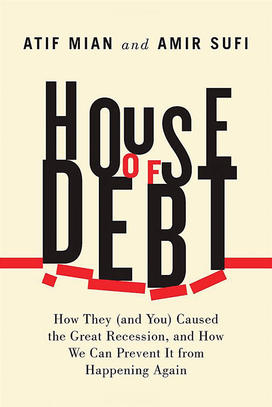
When the economy tanked in 2008, millions of homeowners found themselves stuck: The value of their homes had dropped, yet they still had to make the same mortgage payments. The government acted to preserve the banking system, but average Americans often ended up bankrupt or in foreclosure, and the recovery continues just limping along.
That’s not right, argues Princeton professor Atif Mian — and he has some suggestions about how to make sure it doesn’t happen again. In House of Debt: How They (and You) Caused the Great Recession, and How We Can Prevent It from Happening Again, written with University of Chicago professor Amir Sufi, Mian proposes a new structure for mortgages that would tie loan payments to the fluctuations of the housing market, so that banks share in their borrowers’ risk.
The book criticizes former Federal Reserve chairman — and former Princeton professor — Ben Bernanke for focusing on the financial system while, the authors say, failing to address excessive household debt. The debt problem filtered through the entire economy, as homeowners reduced spending on consumer goods, creating massive job losses. “Workers living in areas completely immune from the housing bust lose their jobs because of the decline in household spending,” the authors say. “Recessions are not inevitable — they are not mysterious acts of nature that we must accept. ... Economic disasters are man-made.”
To prevent another recession, the authors propose flexible-debt programs such as shared-responsibility mortgages, which are structured so that homeowners are protected if the housing market crumbles. Under this arrangement, the principal of the loan and the mortgage payments would decrease if home prices in an area drop. Banks would be compensated for sharing some of the risk by receiving an upfront fee and a 5 percent share of the capital gain if the market rebounded when the borrower sold or refinanced. The authors also argue that student-loan payments should be reduced if a student graduates into a recession, and increased if the labor market is strong. Payments over the life of the loan would fluctuate with the economy.
Protecting borrowers from national economic forces helps the whole economy because it stops those borrowers — who usually are lower- to middle-income — from cutting spending as much if home prices or job prospects decrease, Mian says. For the proposals to be feasible, he points out, tax laws would need to be changed: “The U.S. government has a big role to play here.”













No responses yet